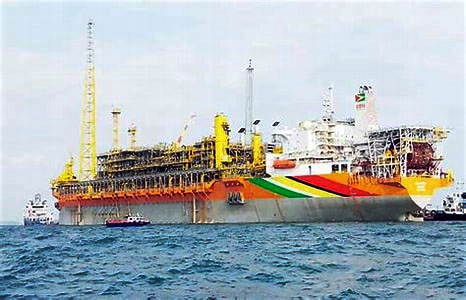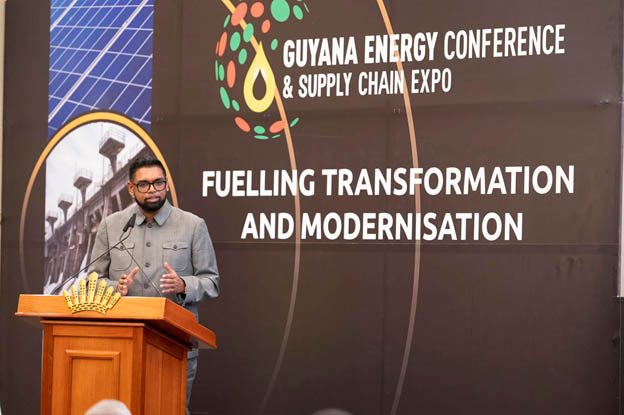
Within all this is a capital, a business hub that had long lost such ‘shape’ as it had. Construction clearly intended for the expansion of the private sector is springing up everywhere, sometimes in the form of renovation of ‘run down’ structures and, as well, in huge investments in new structures clearly intended for entrepreneurial pursuits the size of which the capital has never seen previously. And alongside this is evidence of billions of dollars in investments in requisites like hotels and places of entertainment though the overall makeover has its own implications for a condition of disorder that will take time to remedy. Image, as the saying goes, is everything.

The ‘problem’ that Guyana faces here is that the secret of its petro power status is now well and truly out and besides the rest of the Caribbean where the condition is now an ‘open secret,’ the rest of the world has not been disinterested. The country’s third oil and gas/investment forum was the cause of yet another ‘invasion’, the magnitude of which we are still patently not yet prepared for. When major meetings of the FAO and CARICOM type are thrown in for good measure, resources become strained to breaking point. That the country has not, in its history, previously enjoyed such a high – and favourable – international profile is not a truism that can seriously be challenged. All of it has been a function of circumstance. We have, it appears, put the ‘Banana Republic’ perception to one side.
There is currency in the nature of the external exposure that the country now enjoys. None of it has been a function of a restored political image. It is oil and gas which, singularly, have been the game changer. Out frontline political leaders, President Irfaan Ali and Vice President Bharrat Jagdeo strategically ensure that they remain in the public limelight. There are now unmistakable signs that the President is becoming more comfortable in the raiment’s of political office. Vice President Jagdeo, it is widely felt, functions as a first among equals. More than that, there is an enormous significance to the widespread belief that he is the country’s ‘Oil Czar.’
Through a series of recent visits here from political personages from the Caribbean, United States, Britain, Africa, the Middle East and the United Kingdom, Guyana has come to be known as a country in which things are happening. What is also happening is that countries across the region are seeking to hitch their sails to the country’s mast which is why, for example, Guyana has been anointed the leader in the region’s quest for food security. President Ali, a matter of a few days ago, assumed office as the Chair of CARICOM. Perhaps unsurprisingly, our politicians, particularly our Ministers of Government now find themselves in the public limelight with monotonous regularity, seeking to ‘blow the trumpets’ of their respective portfolios.
What oil and gas would appear to have brought with them, as well, is a modest but energetic restoration of faith in entrepreneurship among Guyanese with small business ambitions. Up until the advent of the country’s petro power, micro and small business pursuits had come to be seen as a ‘stop gap’ with which to stave off perdition. In the fullness of time, one expects, the country’s Business Support Organizations will become more focused on mounting a far more vigorous lobby than they had at this time in pursuit of seeking more room in which the country’s micro and small businesses can function.
Women too – from hardy market vendors to the fashion and beauty types – have emerged to make their mark. There has been room, too, for Agro Processors, never mind the fact that the state is yet to give its full backing to local Agro Processors seeking to make a mark on the external market. All of this has taken place in a national environment of continually growing expectancy while the plight of those who, for one reason or another, have failed to get on the proverbial bandwagon have grouses which they are inclined to make public from time to time.
Historically, race, all too frequently, has been the ‘spoiler’ in the Guyana socio-political setup. The oil and gas largesse has given rise to charges of discrimination, a phenomenon which, historically, Guyanese have been hard-pressed to separate from ethnicity. Where the future of Guyana is concerned, the issue of ethnicity may yet turn out to be an enormous ‘spoiler.’ The current industrial action by the teachers is reflective of a number of considerations, including the justifiable weariness across the public sector, with earnings that can be described, relatively speaking, as peppercorn wages. This, even as the ‘business class’ and the various other sectors are already benefitting, significantly, from the economic upturn deriving from the advent of oil and gas.
Unsurprisingly, the political administration has sought to ‘play up’ the significance of the country’s trillion dollar budget in terms of what it promises. Truth be told, however, it is the sheer overbearing weight of the ‘promises’ that are derived from the budget’s ‘offerings’ that appears to have made what one might call ‘the poorer class’ cautious about its undertakings. Going forward the critical issues are prudent spending, utilizing oil to pursue closure of the gap between the rich and the poor and pushing back the strongly held view that oil will probably bring successive waves of misplaced illegal aggrandizement by those suitably positioned to benefit therefrom (this is likely to apply whatever the political party/parties in office and whatever machinations to the contrary may be visited on the populace).
Here, the argument is likely to be that there is no reason to believe that Guyana will be any different to the various other ‘oligopolies’ across the world. On the other hand there is no reason why Guyana cannot dare to be different.






